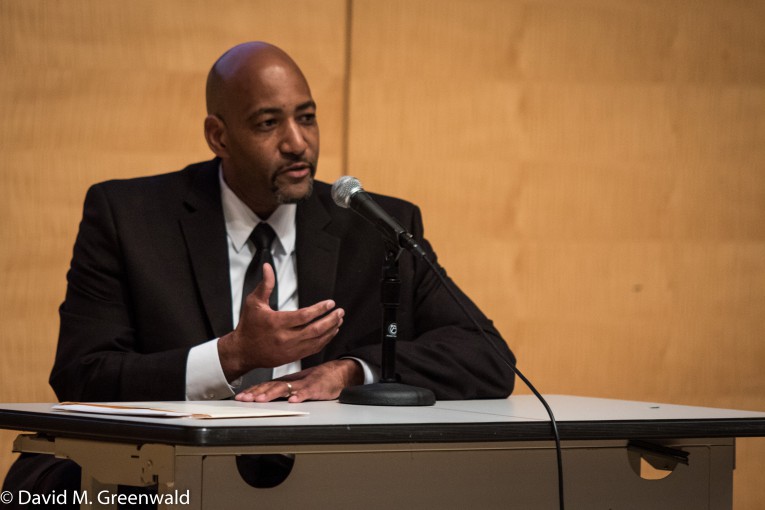

The Justice Department has weighed in on the side of a Boston area law enforcement whistleblower in a groundbreaking False Claims Act lawsuit.
United States ex rel. Ken E. Williams v. City of Brockton was filed in Boston federal court in 2012 on behalf of the U.S. government under the federal False Claims Act.
Ken Williams, a former homicide detective and 15-year veteran with the Brockton Police Department, alleged a long-standing culture of internal bias and unequal treatment in the department.
Williams claims his former employer retaliated against him after he assisted a citizen who was falsely arrested.
The False Claims Act complaint was unsealed in August of 2014. The Justice Department did not join the lawsuit.
Last month, U.S. District Court Judge Indira Talwani dismissed some key allegations of the complaint.
Williams’ lawyers filed a motion for reconsideration.
And last week, the Justice Department weighed in on the side of Williams, calling on the court to reconsider its decision and deny the defendant’s motion to dismiss.
The case comes in the wake of a string of high profile police killings of African Americans and the resulting Justice Department investigations.
“Reporters who have been covering the cases of excessive police force in cities like Baltimore, Chicago, Cleveland and Ferguson keep asking the question, ‘Isn’t there a way to use federal financial leverage to punish police departments with a pattern and practice of civil rights abuses?’ said Thomas Poulin, the attorney who is representing Williams. “Our client’s case shows that such a vehicle already exists. If police departments begin to see that they can potentially lose future federal funding and have to repay prior grants, they will reform their behavior. And it can be done without any new bureaucracy or legislation by leveraging the resources Department of Justice already has in place.”
Like police departments across the country, the city of Brockton received federal grants under the Community Oriented Policing Services (COPS) program, which was established by Congress in 1994.
The 1994 Violent Crime Control & Law Enforcement Act expanded criminal penalties and provided federal funding for 100,000 new police officers as well as for the construction of additional prisons.
But after having watched the eruption of violence in Los Angeles following the acquittal of police officers accused of beating motorist Rodney King, Congress also imposed strict requirements that all federal grant recipients comply with civil rights laws.
The Violent Crime Act empowered the Department of Justice to sue law enforcement agencies if they exhibited a “pattern and practice” of using excessive force and/or violating civil rights, and to use this leverage to obtain a consent decree intended to ensure future compliance with the threat of civil litigation as a stick.
This is the mechanism Department of Justice has used to investigate recent cases of excessive police force in communities around the country.
Unfortunately, such investigations typically occur only after the use of excessive force has caused high profile injuries or fatalities and use only the threat of further litigation, not monetary penalties, to ensure future compliance.
Over 20 cities have consent agreements in place, but several have been, or currently are being re-investigated.
The COPS program was designed to improve community policing by providing funds to hire and train new officers, deploy new crime-fighting technologies and develop innovative strategies to integrate police officers into the community at large.
Since 1995, the federal government has spent over $15 billion on the program.
From 1995 to 2011, the Brockton, Massachusetts Police Department funded the salaries of 41 officers, including Williams, using $5.8 million of COPS grants.
Because COPS is a federally funded and managed program, Congress mandated that recipients must comply with anti-discrimination provisions of the Omnibus Crime Control and Safe Streets Act of 1968, and Title VI of the Civil Rights Act of 1964 forbidding discrimination on the basis of race, color, sex or national origin.
Both municipal and police executives in communities receiving COPS grants must promise or “certify” to the government that the funds will be used as Congress stipulated.
Breaking the promise to use the grants as intended can result in the loss of future COPS funding and sanctions.
“Our contention is that, under the False Claims Act, police departments that have a pattern and practice of civil rights abuses, but misrepresent to the government that they do not, are potentially liable for repayment of COPS grants, can be barred from receiving more federal tax dollars, assessed civil penalties and be required to enter into consent agreements with the Department of Justice to ensure future civil rights compliance,” said Poulin.
In order to file a federal False Claims Act case, also called a ‘qui tam’ action, Poulin says the whistleblower must have non-public information about fraud to a federal government program.
With respect to COPS grants, this would likely be police officers, who witness a pattern of discrimination by fellow officers but get no recourse through internal reporting; or, alternatively, municipal employees who have knowledge of confidential settlements that keep civil rights abuses under wraps.
“The False Claims Act has proven highly effective in using the leverage of federal funding to police illegal behavior in other areas such as off label drug marketing and the use of kickbacks to obtain government contracts. We believe that it can be equally effective in policing the police,” Poulin said.
Article was originally published in Corporate Crime Reporter